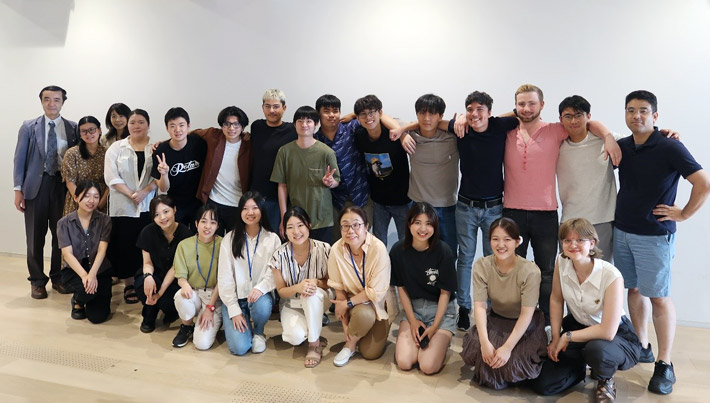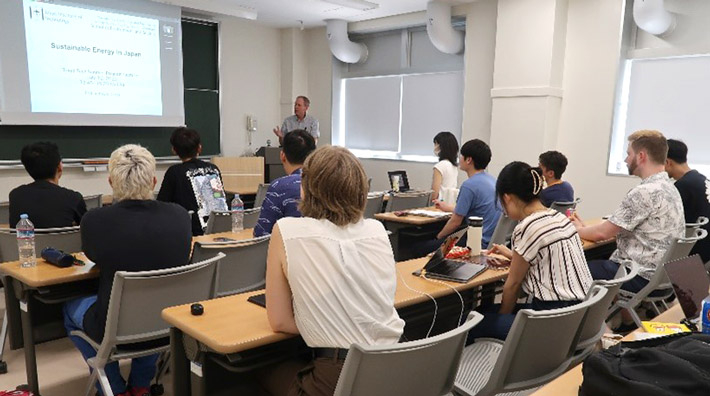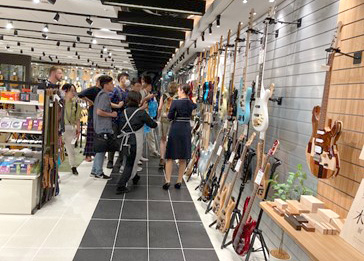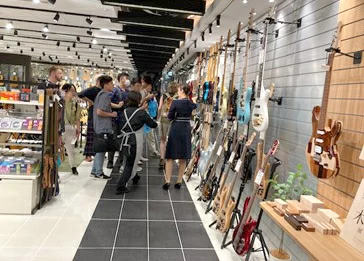Summer Program Brings Together 17 Students to Explore Engineering Design for Social Resilience
Tokyo Tech’s Center for International Education hosted the Engineering Design for Social Resilience Summer Program from July 3 to 28, bringing together 17 participants from the Institute and other educational institutions around the world. This was the first time in four years that the Summer Program was held in person.

Tokyo Tech Summer Program 2023 participants
As the world faces numerous far-reaching challenges such as the COVID-19 pandemic and other public health issues, climate change caused by global warming, and various forms of natural disasters, there are growing expectations for humans and technology to work together to create a more resilient society. This year’s Summer Program offered an opportunity to examine future technologies that may provide solutions to these challenges through lectures and lab experiences in the fields of “AI, health, and wellbeing,” “disaster prevention and design,” and “energy issues,” all of which are being actively researched at Tokyo Tech.
Lectures and lab immersion
To kick things off, students at the program orientation session heard from Professor Miki Saijo, who is also the director of the Tokyo Tech Summer Program. Saijo spoke to the program participants about the concepts and definitions of social resilience and engineering design, touching also on the historical background, prior research, and practical examples of these areas.
Over the next three days, the program participants enjoyed the following lectures by Tokyo Tech faculty members:
- Engineering design and disaster prevention technology
Associate Professor Takumi Ohashi, School of Environment and Society - Future sustainable health conditioning society realized by open innovation
Professor and Vice President for International Affairs Nobuhiro Hayashi - Sustainable energy in Japan
Professor Jeffrey Scott Cross, School of Environment and Society

Lecture on sustainable energy in Japan by Prof. Cross
After the lecture sessions, the participants were offered the opportunity to join one of several laboratories for a period of seven days. This immersion allowed them to deepen their understanding regarding important experiments and analyses in the research fields that were of interest to them.
Throughout the program, weekly homeroom activities to discuss student progress were led by Associate Professor Saho Kawashima, a specialist in writing and communications. This allowed students to emphasize and probe further any topics that they found particularly interesting, and to address questions about technology in their home countries, all of which were used as a basis for their essays and presentations.
Fieldwork and cultural exchange

At cultural exchange event discussing resilience and sustainable topics related to musical instruments
The program also included a day of fieldwork during which the participants visited Haneda Chronogate, a massive logistics facility run by Yamato Transport Co., Ltd., to learn about sustainable delivering management systems. The students also received training in disaster prevention at the Tokyo Fire Department’s Life Safety Learning Center.
At a more relaxed cultural exchange event, the participants enjoyed playing various musical instruments during the Yamaha Ginza Shop tour. With its well-designed acoustics, soundproof facilities, and earthquake-resistant structure, the building also offered a glimpse of resilient architecture in Japan.
Another popular cultural event among the students was a tranquil tea ceremony held at the International House on Ookayama Campus. Here, the participants were able to experience the peaceful space and time that teamaking creates in resilient Japanese daily life.
Group presentations on final day
On the final day, the participating students gave group presentations about what they had learned during the program, and suggested possible technologies that could create a more resilient society in the future.
At the closing ceremony, Professor Saijo offered the students some final encouragement with her comments on the group presentations. Vice President Hayashi presented the students with their certificate of completion and invited everyone back to Tokyo Tech through future opportunities such as the International Graduate Program.
While exploring ways to create a more resilient global society, the participants of the Tokyo Tech Summer Program once again forged many new friendships regardless of nationality, language, or specialization. All those involved in the program look forwarding to witnessing how these students apply their newly acquired knowledge in their future study and research.

